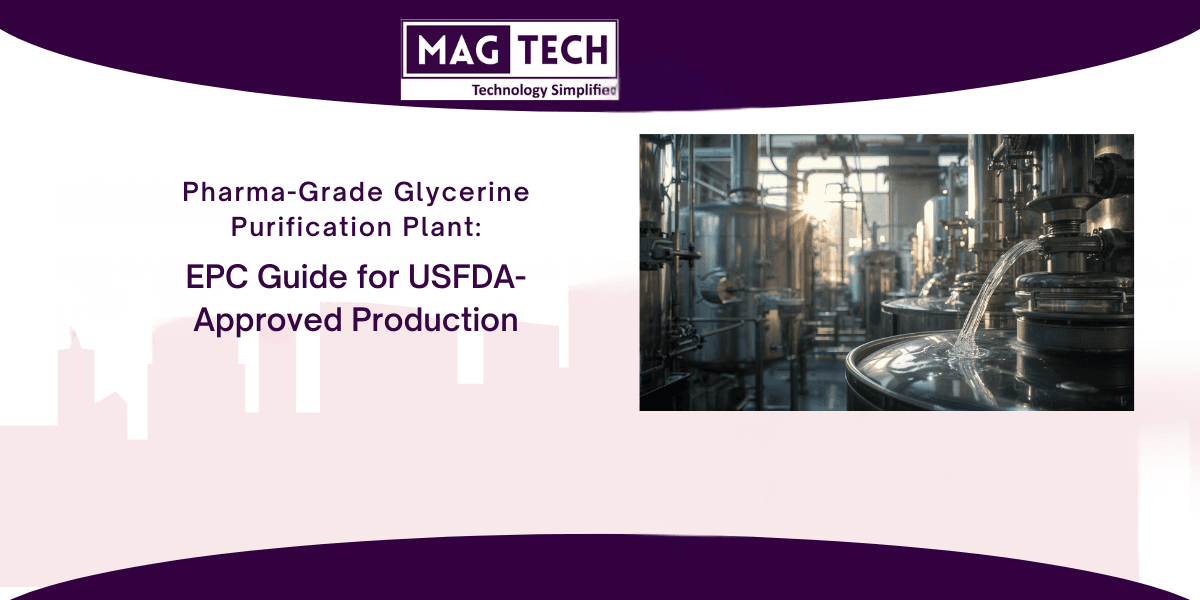Refined glycerin, a versatile compound found in countless everyday products, originates primarily as a byproduct of biodiesel production. When vegetable oils undergo transesterification—a chemical process that converts these oils into biodiesel fuel—crude glycerin emerges as the main secondary output.
This industrial process yields glycerin in its raw, unprocessed state, containing various impurities, including methanol, soaps, catalysts, salts, and non-glycerin organic matter. It is then collected and refined to achieve a purification level. Let us know what refined glycerin is and why it is preferred in high-quality products.
Table of Contents
ToggleWhat is Refined Glycerin?
Refined glycerin represents the purified form of crude glycerin that has undergone extensive processing to remove impurities and standardize its quality. Refined glycerin is 99.5% or more in purity. The purification process eliminates contaminants such as methanol, fatty acids, salts, and other organic materials that would otherwise compromise product performance and safety.
Unlike its crude counterpart, refined glycerin delivers predictable physical properties, including stable viscosity, consistent humectant abilities, and reliable preservation characteristics. These standardized qualities make refined glycerin the preferred choice for formulators developing high-performance products across pharmaceuticals, cosmetics, and food industries.
Why is Refined Glycerin Preferred in Different Industries?
When manufacturers choose refined over crude glycerin, they’re making a decision based on several key factors that directly impact product quality, safety, and performance. Understanding these benefits helps explain why companies willingly invest in the higher-cost refined version rather than using the less expensive crude alternative.
Chemical Reasons for Preferring Refined Glycerin
- Absence of Reactive Impurities: Crude glycerin contains fatty acids, methanol, and catalyst residues that can trigger unwanted chemical reactions in formulations. These reactions might cause:
- Consistent pH Value: Refined glycerin maintains a neutral pH (around 7), while crude glycerin often has an alkaline profile due to residual catalysts. This neutrality:
- Prevents irritation in skin and personal care products – Alkaline substances can disrupt the skin’s natural acid mantle (pH 4.5-5.5), potentially causing dryness, irritation, or breakouts, especially for sensitive skin.
- Avoids interference with pH-sensitive ingredients – Many preservatives, acids, and active ingredients only work within specific pH ranges, and crude glycerin’s variable pH can render them ineffective.
- Ensures stability of acid-base balanced formulations – Products like shampoos and cleansers rely on precise pH levels for proper function; crude glycerin can throw off this balance, affecting product performance.
- No Cross-Contamination Risk: The purification process removes potential allergens and contaminants that might:
- Trigger skin sensitivities in cosmetic products – Plant proteins, residual processing chemicals, and other allergens in crude glycerin can cause reactions in sensitive individuals, creating liability issues for manufacturers.
- Compromise pharmaceutical purity requirements – Medical products must meet extremely strict purity standards; even trace contaminants can disqualify a batch, wasting production resources and potentially endangering patients.
- Affect food taste or safety profiles – Food-grade glycerin must be absolutely free of substances that could alter taste or pose health risks, especially since glycerin is often used in children’s products and medicines.
- Enhanced Stability: The removal of oxidation-prone impurities means refined glycerin:
- Remains stable under various temperature conditions – Unlike crude glycerin, refined versions won’t separate, crystallize, or change consistency when exposed to heat, cold, or temperature fluctuations during shipping and storage.
- Doesn’t develop rancidity or off-notes over time – The purified product lacks the unsaturated fatty acids that can go rancid, ensuring products remain pleasant to use throughout their intended shelf life.
- Maintains its properties throughout a product’s shelf life – The humectant (moisture-retaining) and solvent properties remain consistent from manufacture to final use, preserving product quality.
Physical Reasons for Preferring Refined Glycerin
- Superior Clarity and Appearance: Refined glycerin is colorless and crystal clear, while crude glycerin has a brownish or yellowish tint. This clarity:
- Consistent Viscosity: Refined glycerin provides predictable thickness and flow properties because:
- It has a standardized concentration (typically 99.7%). This consistency allows manufacturers to use the exact same amount in every batch, ensuring products feel the same every time.
- It lacks variable impurities that affect flow behavior – Foreign particles and varying levels of water content in crude glycerin create unpredictable thickness, making manufacturing difficult.
- Its performance in mixing and processing remains uniform – Production equipment can be calibrated once and then operate efficiently, rather than needing constant adjustments to account for crude glycerin’s variability.
- Better Sensory Properties: The refinement process eliminates the unpleasant characteristics of crude glycerin:
- No offensive odor that would require masking with fragrances – This is particularly important in fragrance-free products for sensitive skin, where additional scents would defeat the purpose.
- Smooth, non-sticky feel on skin when used in personal care – Refined glycerin absorbs quickly without the tacky residue that crude glycerin often leaves behind, creating a more luxurious user experience.
- Clean, slightly sweet taste for food applications – In candies, icings, and liqueurs, refined glycerin contributes a mild sweetness without any bitter, soapy, or chemical aftertaste.
- Improved Solubility and Compatibility: Refined glycerin:
- Dissolves completely in water without leaving a residue – This allows for crystal-clear solutions and prevents any gritty or particulate feel in the final product.
- Blends seamlessly with other ingredients – Creating stable emulsions and suspensions becomes much easier, preventing separation during production and storage.
- Forms stable mixtures with both water-soluble and oil-soluble components. This versatility makes refined glycerin an excellent bridging ingredient in complex formulations, helping create products that contain both water-loving and oil-loving ingredients.
- Consistent Viscosity: Refined glycerin provides predictable thickness and flow properties because:
Practical Benefits Across Industries
- Pharmaceuticals: Pharmaceutical manufacturers require USP or EP grade refined glycerin because:
- It meets stringent purity requirements for medicinal products – Regulatory bodies like the FDA and EMA have strict guidelines that only refined glycerin can satisfy.
- It ensures dosage accuracy by behaving predictably in formulations. When medications need precise delivery, refined glycerin’s consistent properties prevent under or over-dosing.
- It prevents potential adverse reactions from impurities – For injectable medications and those used by immunocompromised patients, even trace impurities could cause dangerous reactions.
- Cosmetics and Personal Care: Beauty product formulators choose refined glycerin because:
- It provides reliable moisturizing properties without irritation. The humectant effect draws moisture to the skin without the irritating impurities found in crude glycerin.
- It creates a smooth, non-greasy skin feel – Products glide on easily and absorb quickly, a key quality marker for high-end skincare.
- It extends product shelf life without degradation – Preventing oxidation and microbial growth, refined glycerin helps products maintain their intended sensory qualities for longer periods.
- Food and Beverages: Food manufacturers prefer refined glycerin as:
- It carries a “clean label” status important to consumers – With increased scrutiny of ingredient lists, refined glycerin’s simple, recognizable name satisfies consumer demand for transparent labeling.
- It maintains consistent sweetness and mouthfeel – Candies, frostings, and liqueurs depend on glycerin’s unique texture and subtle sweetness.
- It helps preserve moisture in baked goods and confections without unwanted flavors, preventing products from becoming stale or dry without contributing any unwanted taste notes.
By investing in refined glycerin, manufacturers ultimately save money and protect their brand reputation by avoiding the production issues, quality inconsistencies, and potential safety concerns that would arise from using crude glycerin in their final products.
The only catch is to produce refined glycerin from the crude byproduct of biodiesel production. Here is how it is done.
How to Clean Crude Glycerin to Make It Refined?
Step 1: Pretreatment
Crude glycerin contains methanol, soap, salts, and fatty acids. Treating it with sulfuric acid and caustic lye removes these impurities. A decanting chamber separates lighter contaminants.
Step 2: Dehydration
A flash removal unit eliminates methanol, while a heat exchanger removes moisture.
Step 3: Decolorization
A bleaching unit with activated carbon clears dark impurities. Filtration ensures transparency.
Step 4: Distillation & Deodorization
Distillation separates glycerin from water and volatile substances. Deodorization removes residual odors, producing high-purity, for industrial use.
This separation and refinement process depends on the glycerine purification unit a biodiesel manufacturing facility has adopted. Here, the technical expertise of the best glycerine purification solution providers works perfectly.
Achieve 99.5% Purity of Refined glycerin with MAGTECH
MAGTECH offers the best glycerine purification solution by including the latest technologies and following the glycerine production capabilities of a biodiesel plant. Our experienced engineers calculate the specific requirements and leave space for scaling the process.
Why wait? Harness the potential of refined glycerin with our assistance and generate another revenue channel to make your biodiesel production more sustainable.


